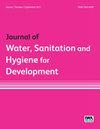菲律宾一条主要河流中棘阿米巴虫的发生:对水质和健康的影响
IF 1.4
4区 环境科学与生态学
Q3 WATER RESOURCES
Journal of Water Sanitation and Hygiene for Development
Pub Date : 2023-10-25
DOI:10.2166/washdev.2023.174
引用次数: 0
摘要
河流是重要的淡水资源。它们为家庭和娱乐用水提供水源,并作为各种微生物的生态场所。自由生活的变形虫被认为是淡水中自然存在的生物。然而,它们的流行可以表明某一特定水源的水质。从马里基纳河的9个不同地点收集了45个地表水样本。将样品在带有大肠杆菌的非营养性琼脂(NNA)中进行处理和培养,并在光镜下观察14天。36个(80%)样品产生了正的阿米巴生长。进一步的分子检测利用特异性引物JDP1和JDP2证实棘阿米巴属的存在。目前的研究结果表明,自由生活变形虫(FLAs)的检出率有了显著的提高。由于一些人为和非人为因素,马里基纳河的持续恶化可能是造成这一现象的原因。为了恢复马里基纳河,应该考虑河流清理、移民计划和严格执行废物处理法律。本文章由计算机程序翻译,如有差异,请以英文原文为准。
Occurrence of Acanthamoeba spp. in a major river in the Philippines: impact on water quality and health
Abstract Rivers are important freshwater sources. They provide water for domestic and recreational use and serve as ecological sites for various microorganisms. Free-living amoebae are considered naturally occurring organisms in freshwater. However, their prevalence can suggest the water quality at a given source. Forty-five surface water samples from nine different sites were collected from the Marikina River. Samples were processed and cultured in non-nutrient agar (NNA) lawned with Escherichia coli, and were observed for 14 days using a light microscope. Thirty-six (80%) samples yielded a positive amoebic growth. Further molecular testing confirmed the presence of Acanthamoeba spp. using specific primer sets, JDP1 and JDP2. The current results of this study have shown a remarkable jump in the detection rate for free-living amoebae (FLAs). The continued deterioration of the Marikina River due to several human and non-human factors may have been the reason for this phenomenon. River clean-up, resettlement programs, and strict implementation of laws on waste disposal should be considered to rehabilitate the Marikina River.
求助全文
通过发布文献求助,成功后即可免费获取论文全文。
去求助
来源期刊

Journal of Water Sanitation and Hygiene for Development
WATER RESOURCES-
CiteScore
3.10
自引率
11.80%
发文量
58
审稿时长
16 weeks
期刊介绍:
The Journal of Water, Sanitation and Hygiene for Development is a peer-reviewed journal devoted to the dissemination of high-quality information on the science, policy and practice of drinking-water supply, sanitation and hygiene at local, national and international levels.
 求助内容:
求助内容: 应助结果提醒方式:
应助结果提醒方式:


